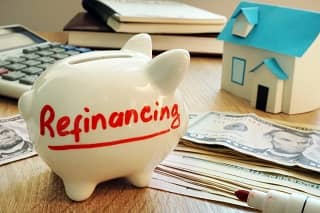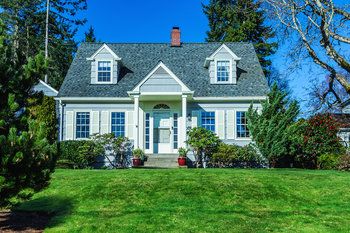Mortgages should be treated as part of your investment portfolio and retirement strategy, and learning to manage your mortgage along with the rest of your finances is just a part of life. Younger homeowners and older homeowners have different goals and challenges when refinancing their mortgages. It's important to learn why and how mortgage financing -- and refinancing -- strategies should change as you get older.
There are many avenues and circumstances surrounding mortgage and refinancing choices. The discussion that follows represents just a few possible paths and concepts to consider. Much depends on your qualifications, risk tolerance and what the market has to offer you in terms of products and interest rates.
Mortgage Planning at 25-40: Going Long.... Or Not
Younger homeowners differ from older ones in significant ways, and these differences should be considered when selecting a mortgage product or strategy. When you're just starting out, you're likely to have fewer assets, less home equity, possibly more debts and a shorter credit history. What you have more of is time.
Changing Stations
Younger homebuyers tend to sell and move fairly frequently. Life-altering events -- finishing college, getting married, starting a family, moving to take a better job -- often involve an address change. But if your address isn't likely to be fixed for a long period of time, a case can be made that your mortgage rate doesn't need to be, either. Automatically deciding that a long-term fixed-rate mortgage is what you want when buying your home isn't necessarily the best or most appropriate choice.
A recent study by the National Association of Realtors found that the median age of a first-time homebuyer was 33 years. Although lengthening somewhat recently, first-time homebuyers usually stay put for a short-to-medium term time frame ranging from 4 to perhaps 8 years. Such a short-to-medium term time frame can put other mortgage products in play, such as a hybrid ARM with a fixed interest rate for five or seven years. Of course, whether or not to consider them depends on whether or not you'll get a reasonable break in the interest rate compared to a long-term fixed-rate mortgage, and how certain you are in your time-period expectations.
A typical hybrid ARM supplies a fixed interest rate for the first five or seven years, then the loan's interest rate adjust each year after that. This may be changing; new ARMs coming into the market may be available only with interest-rate resets every six months. Yes, rates can move higher once the fixed-rate period ends, but if your pretty certain about your future plans, odds favor you'll have moved on by then. Regardless, since it is only steady for a short while, the fixed interest rate portion should be available at a significant discount compared to a 30-year FRM. How big the break is depends on market conditions, but let's look a 1 percent difference in rate as a comparison.
With such a break, how much could you save? On a $300,000 mortgage, getting a 5/1 ARM at 2.5% instead of a fixed mortgage at 3.5% saves you about $162 a month. Over that five years period, the difference in interest cost between the two rates is over $14,500, enough to make a dent in outstanding student loans, build an emergency fund or start saving for retirement. If you're prudent, you might even bank some of the savings as a hedge against higher future loan payments should your expected time frame get extended a bit.
Early Retirement Is Not for You or Your Mortgage
If you do take a long-term fixed-rate mortgage, mortgage experts love to extol the virtues of paying off a mortgage early. Yes, you can save thousands in interest charges and yes, you have the security of fully owning your home and having no mortgage payment sooner, but this strategy isn't appropriate while you still carry high-interest debt, leave retirement accounts underfunded, or have insufficient cash set aside for emergencies.
Prepaying your mortgage is a worthy goal, but should probably be the last thing to do on your list of financial things to accomplish.
Related: HSH's comprehensive Guide to Prepaying Your Mortgage
While prepaying your mortgage has a fixed rate of return (interest savings), money send to retire your loan earlier than scheduled might better be used elsewhere. Most younger investors' portfolios are generally geared to take on higher risk in pursuit of higher returns, so money paid to reduce the principal on your mortgage is money unavailable for higher-yielding investments.
Mortgage Planning at 40-55: Avoiding a Midlife Money Crisis
By your 40s, you have probably hit your financial stride and may be in a home which you'll be keeping for some time. You've established long-dated credit, have probably accumulated some assets, and are likely in your peak earning years. At the same time, you should be seriously planning and funding your retirement, may have college expenses for your children (or will soon), and may feel stressed trying to handle expanding financial obligations. What you should do with your mortgage (if anything) will depend on both the past and the future.
Refi? Sure. But What to Do? It depends.
How do the past and the future come into the equation? Real savings from a mortgage refinance comes from both a lower interest rate and also from trimming some years off of your remaining mortgage term. However, real cash-flow improvements come from a lower interest rate and re-extending the loan term to a new 30 years. Where you are in your existing mortgage matters; the longer you have been in it will determine whether or not real savings can be had or only cash flow improvements (or both). By way of example, let's look at a scenario where you are 45 and 10 years into a $200,000 30-year loan at 4%. Right now, your remaining balance is $157,568 and your current payment is $954.83 per month.
If you can refinance to a new 30-year loan at 3%; your monthly payment will drop by about 30% to just $664.31, improving your cash flow by $290.52 each month -- but that cash-flow improvement means you'll now be paying interest on your home until you are 75 years old! Worse, the total interest cost of the two loans over that (now) 40-year term is about $10,000 more than if you hadn't refinanced in the first place. Compare this against not refinancing and therefore having no mortgage at all between 65 and 75, where having no $954.83 per month to pay over those 10 years would mean almost $115,000 in real savings.
If it;'s not cash-flow improvement you are after, but rather actual savings, consider instead a refinance to a new 15-year loan; no cash-flow improvement here -- in fact, your payment will rise by about $96 per month -- but you'll have no mortgage starting at age 60. Better still, the two mortgages together will have a 25-year total term and cost you about $40,000 less in interest cost -- real savings, plus you'll get those years of no-monthly-payment, future cash-flow improvements sooner, too.
Can't or don't want to cover a higher monthly payment? Take a 20-year term. You'll usually get about the same rate as a 30-year, but won't re-extend your remaining loan term, will get about $81 per month in cash-flow gain and the total costs of two mortgages (total of 30 year term) will be over $19,000 less than if you never refinanced. You'll get some cash flow improvement and save money, too.
Related: Calculator: Prepay your mortgage to any term you want
An alternative would also be to refinance to a new 30-year term but then prepay your mortgage as though it had a 20 or even 15-year term (or any term you might like). Since any higher monthly payment would be voluntary, you can retain budgetary flexibility but will need to be disciplined in your finances to keep your total costs from increasing. Using the example above, a refi to a 3% 30-year FRM but then prepaying at $100 per month from day one would see you improve your cash flow by $190 per month, have a total term of 35 years -- but still manage to lower your total interest cost for the two loans (total of about 34 years overall) by about $7,500. Not too shabby, but you'll need to stick to it.
So where you are in the past -- how long you have been in your existing loan -- matters to deciding whether to refinance. How long you plan on staying in the new loan can matter as to whether or not your refinance saves or costs you money. Since refinancing isn't free, there's also the matter of how you will pay for your refinance and how this affects your current and future finances. While we've looked at long-range examples above, how long you'll actually remain in your new mortgage will determine whether or not you recover any costs, achieve any real cash-flow improvement or achieve any actual interest savings. The combination of costs, interest rates and time frames all matter in this regard.
Mortgage Planning at 55-70: Enjoying the Sunset (Hopefully)
Financial planners tend to be of two minds about mortgages for retirees. On one hand, many people aren't comfortable with the idea of a mortgage obligation after retirement. However, choices you made in your 40s and 50s can dictate whether you'll be looking at then end of payments or what may seem like never-ending payments.
If you do decide to carry a mortgage into your later years, you won't be alone. According to the Federal Reserve Survey of Consumer Finances (conducted every three years) the percentage of older homeowners who still have mortgage debt has been climbing; in 1989, 26.5% of homeowners over 65 had a mortgage, but by 2019, that figure was 55.8%. Refinancing and home equity borrowing have created or extended payments where none existed before, so having a mortgage in retirement is something that lots of people are trying to manage.
As with homeowners in the 40-55 group, whether you should refinance or not of course matters as to where you are in your loan -- it's probably not a great idea to refinance if you have just a few years left to go, after all. But if you're only in the middle of a 30-year mortgage at age 62, should you refinance?
The answer can be both yes or no. Much depends upon how well situated you are for retirement and what future income and expenses you can expect. If, as above, you're paying $954.83 per month, such a large commitment against your income well into your 70s could impede retirement plans, dreams or goals. Depending on where the funds to do so are coming from, it can make great sense to close out your mortgage if you can -- but it probably doesn't make sense to sell holdings or empty your savings to pay off your loan. However, if there's no realistic chance of being free and clear of your mortgage anytime soon, refinancing could make things more manageable for you.
Lets say that you are considering a refinance to another 30-year term of a mortgage you took out in a refinance transaction when you were 45 (per the above). Your old and new interest rate might both be 3%, but by now, your remaining loan balance is only $96,197 -- so your monthly payment would drop from $664.31 to just $408.10 -- a reduction of more than 38%. This decline could make the commitment against your fixed retirement income more manageable, possibly free up funds for boosting your contribution to your 401k or IRA before you leave the workforce and help to improve your future retirement finances or be used to pay off outstanding debts before you retire, lessening their burden on your future income. Yes, there of course are long-term interest costs, but those may or may not be your concern.
Refinance Proactively
Retirees also face challenges when refinancing because mortgage lenders want to see income before they grant home loans, and as a retiree, your income may be diminished somewhat. Other retirees run into unexpected problems if they take part-time jobs or go from W2 employee to 1099 consultant. You need a two-year history of this kind of income before a mortgage lender can count it for loan approval purposes. If you plan on retiring soon or changing the way you earn money, consider refinancing first, while your work history is solid and your income is sufficient.
Of course, once you're past 62 with a mortgage, one way to manage it is to replace it with a reverse mortgage rather than refinancing. There's a lot to know and consider before you go that route, however, but if having a mortgage payment burden is too much to handle for your finances as retirement beckons, it's one avenue to consider. HECMs aren't for everyone, but they can help you cover expensive emergencies or improve your quality of life. They can even be used to downsize and purchase a new home.
Related: HSH's Guide to Reverse Mortgages and HECMs
Mortgage Planning at 70 and beyond
Still have a mortgage after 70? What to do now depends on what you did or didn't do before, and everything at this point depends on how much time is left on the loan and your ability to manage the monthly expense. Have just a few years left to go and are handling payments OK? Stay the course and get your loan paid off. Have a few years left and monthly mortgage payments are pinching you financially? A refinance to a new 30-year term or a reverse mortgage may be the solution, but you may be considering different outcomes at this point -- downsizing, relocating or other choices -- and there may or may not still be reasons to consider changing your mortgage. Before you decide to make any moves, though, you'll probably want to sit down with your financial or retirement planner.



